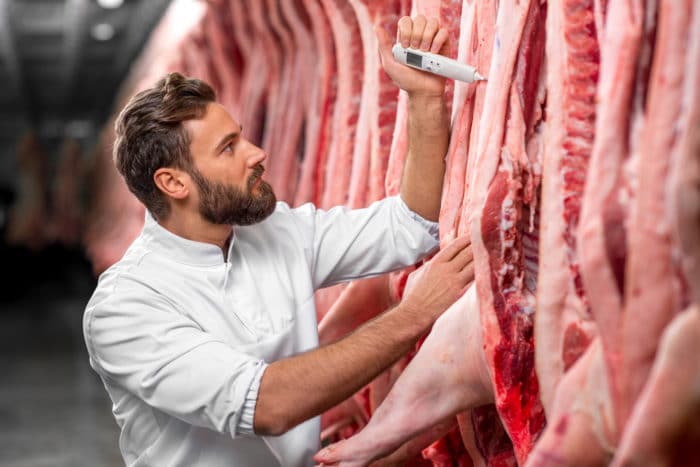Why We Love It
-
$30,940Potential Avg. Salary
-
5%Job Growth Rate
-
Growing DemandJob Outlook
-
Don't Take Work HomeCareer Attribute
As a butcher, your work involves cutting, preparing and selling meat in a butcher’s shop or at a supermarket. You may also make meat products such as sausages, burgers and pies.
Recommended Schools
What is a Butcher?
Duties
Butchers typically perform the following tasks on a daily basis:
- Demonstrate a solid foundation cooking proteins and share knowledge with guests on selecting and cooking different meats like poultry, lamb, beef, pork or fish.
- Set up and breakdown daily workstation which includes cutting boards, knives, linens like towels, shirt and apron, equipment, etc.
- Weigh, wrap and price all raw and cooked products accurately for customers.
- Maintain updated knowledge regarding the maintenance and use of equipment and tools in accordance with local health and safety regulations.
- Stay up to date on products, services and short- or long-term gaols, as well as company and store information.
Day In The Life
During a typical day in this role, your work can include buying, ordering and storing meat stocks. Handling deliveries and ensuring consistent quality. At retail outlets, you will turn larger pieces of meat into portion sizes that can be purchased by restaurants or consumers and store them in refrigerators or freezers at the required temperature. Since all meat is not cut into steaks or chops, you will also grind, roast and make sausages out of the remaining parts.
Patience and careful attention to detail is a must in this type of role – if you are not careful, you may seriously injure yourself. Further, serving customers effectively and providing them correct information on preparing and cooking meat is vital to succeed in such a role. Sometimes, you will also drive meat supplies to the premises of wholesalers, marketplaces and customers.
Work Schedule
Most butchers work full time. As a butcher, your work schedule will be 40 hours per week, which can sometimes include early mornings, late nights and weekends, with some time off mid-week. Timings can vary depending on customer demand and workload. Much of the day will include moving heavy meat joints to and from cold storage, preparing cuts of meat as requested and serving customers. Work can often be dangerous with slipper floors, use of knives and other sharp tools.
Growth Of The Job
Growth in this job area will occur from increasing processing plants, with more large chains and restaurants outsourcing their meat requirements and butchery. Employment of butchers is expected to grow by 5% between 2014- to 2024, around the average for most occupations. Difficult working conditions result in frequent job opportunities to replace workers who leave each year.
With sufficient experience, butchers move on to work in larger and more established independent butcher shops, supermarkets, departmental stores or set up their own business. You may also choose to work at a meat hygiene service, conducting quality checks at meat plants. Some butchers transition into managerial or supervisory roles at large retail chains after many years of working in the field.
Typical Employers
Employers value previous knowledge of meat cutting techniques and working in the retail sector. Some examples of employers hiring butchers include Rancho Markets, Bi-Rite Family of Businesses, Fogo de Chao, Kimpton Hotels & Restaurants, Marriott International, Inc., Jerry’s Enterprises Inc., etc.
Recommended Schools
How To Become a Butcher
While there are no set requirements for this role, you should have to at least be 18 years of age and have a good understanding of the trade and previous experience. A minimum of a high school diploma is also necessary. Useful experience prior to joining this field includes working at a farm, kitchens, meat-processing plants or in a butchery. Written and oral English language skills are a plus, along with professional communication skills. You must also be comfortable with continuous standing, walking, bending, reaching, sitting and carrying loads between 15-50 lbs.
These days, most butchers start with specialized training programs, where to learn to master using machinery and handling different types of meat. Those who train for a year or two are then considered fully trained and ready to find a job in the market. Ems also receive training in food safety to minimize the risk of foodborne pathogens in meats.Butchers who adhere to more religious dietary guidelines for food preparation could have to undergo more specialized training and certification, before getting endorsement by a religious organization to prepare meat. It is important to note that there is no official certification process for butchers, which leads to unpredictable career paths.
Butcher Salary Data
We’ve provided you the following to learn more about this career. The salary and growth data on this page comes from recently published Bureau of Labor Statistics data while the recommendations and editorial content are based on our research.
National Anual Salary
Low Range
$22,570Average
$30,940High Range
$46,820National Hourly Wage
Low Range
$11/hrAverage
$15/hrHigh Range
$23/hrHow do Butcher salaries stack up to other jobs across the country? Based on the latest jobs data nationwide, Butcher's can make an average annual salary of $30,940, or $15 per hour. This makes it an Above Average Salary. On the lower end, they can make $22,570 or $11 per hour, perhaps when just starting out or based on the state you live in.
Salary Rankings And Facts
#685 Nationally for All Careers
Highest Education Among Butchers
- 0.2% Doctorate
- 0.3% Masters
- 3.3% Bachelors
- 3.8% Associates
- 16.7% College
- 39.3% High School
- 36.4% Less than High School
Job Growth Projections and Forecast
2014 Total Jobs
139,0002024 Est. Jobs
146,000Job Growth Rate
5%Est. New Jobs
7,000How does Butcher job growth stack up to other jobs across the country? By 2024, there will be a change of 7,000 jobs for a total of 146,000 people employed in the career nationwide. This is a 5% change in growth over the next ten years, giving the career a growth rate nationwide of Below Average.
Growth Rankings And Facts
#438 Nationally for All Careers
What Companies Employ The Most Butchers
| Industry | Current Jobs | New Jobs Needed | % Increase |
|---|---|---|---|
| Grocery stores | 101,200 | 4,500 | 5% |
| Specialty food stores | 11,800 | 300 | 0% |
| Animal slaughtering and processing | 10,200 | -100 | 0% |













